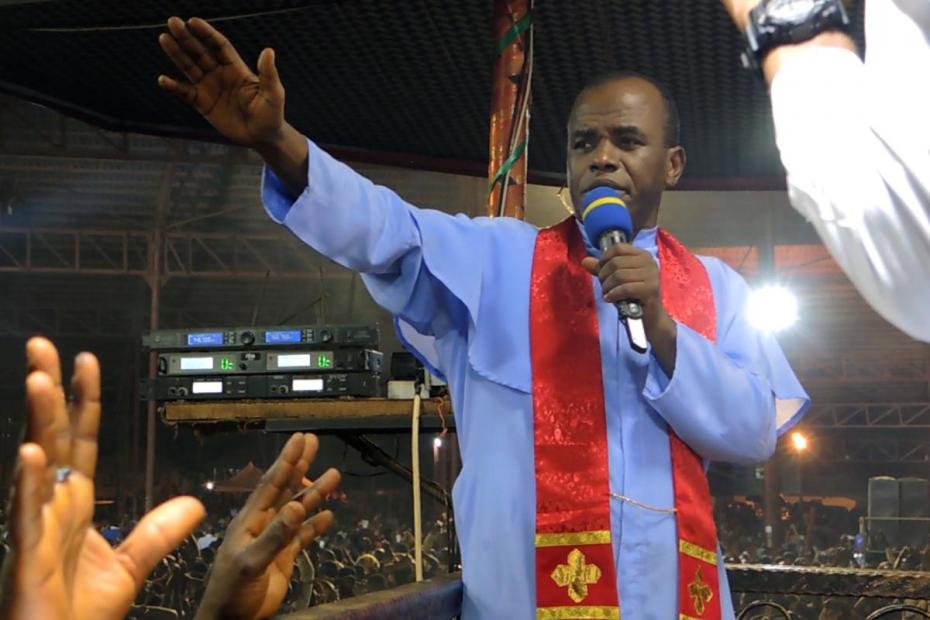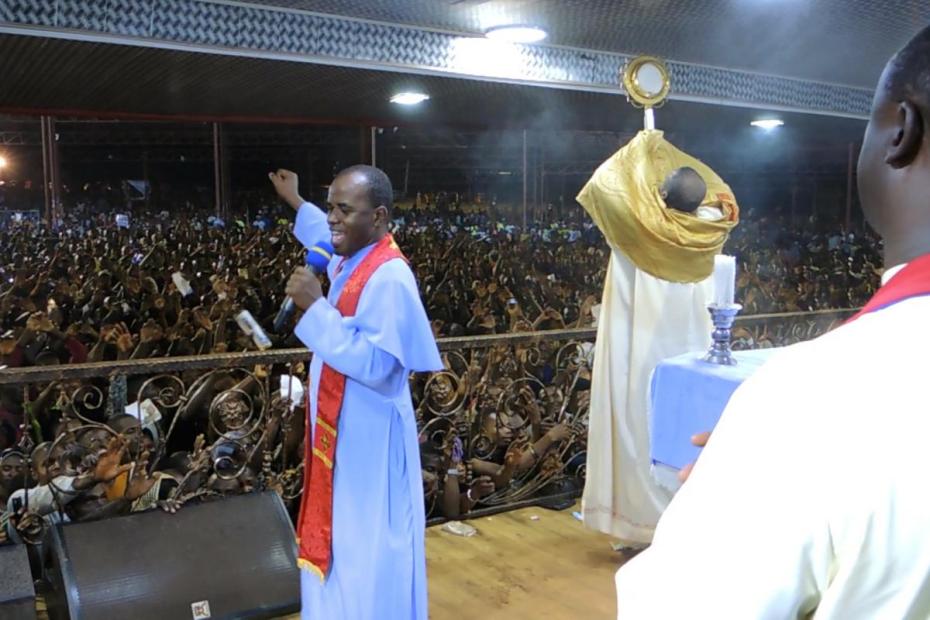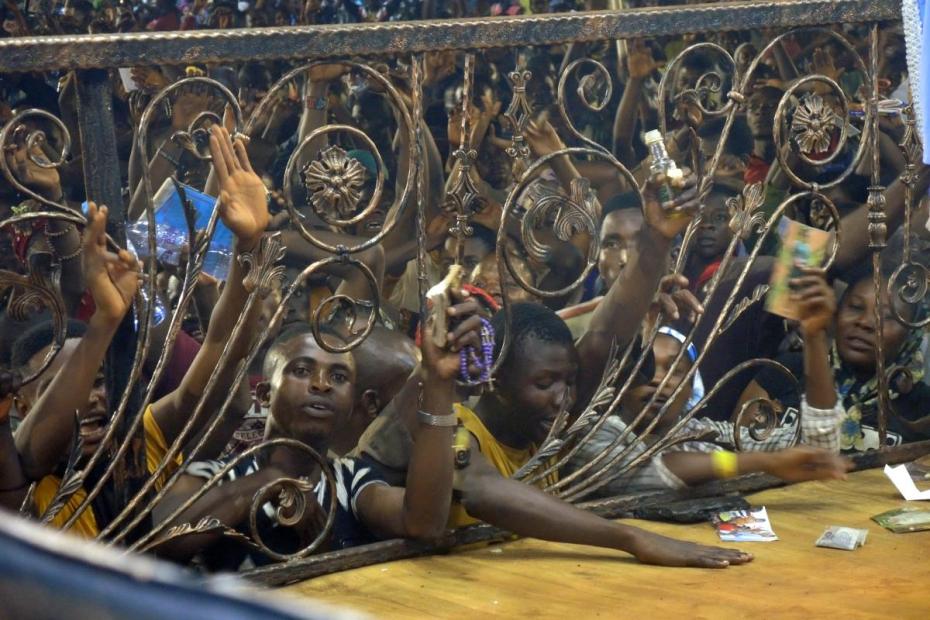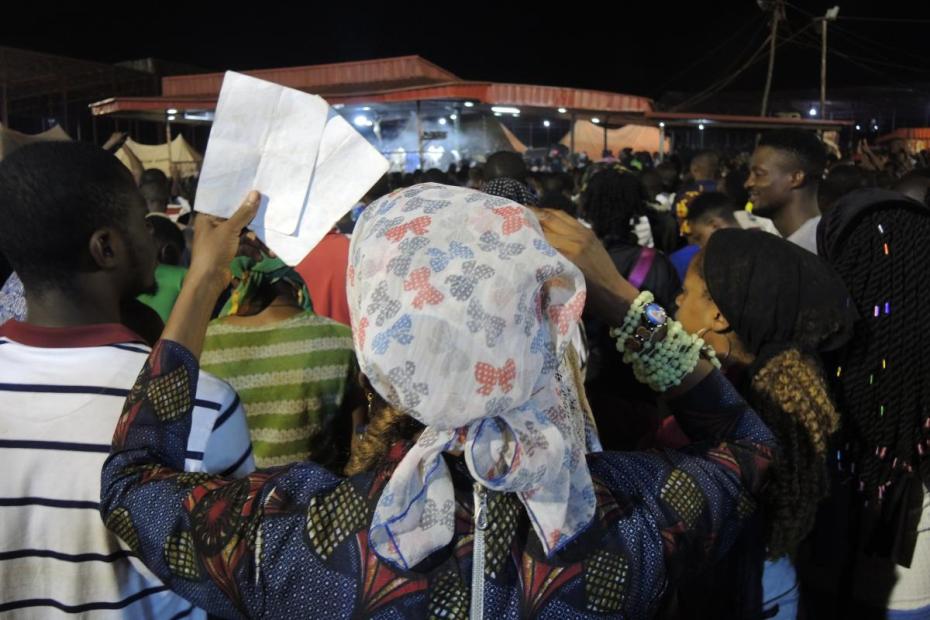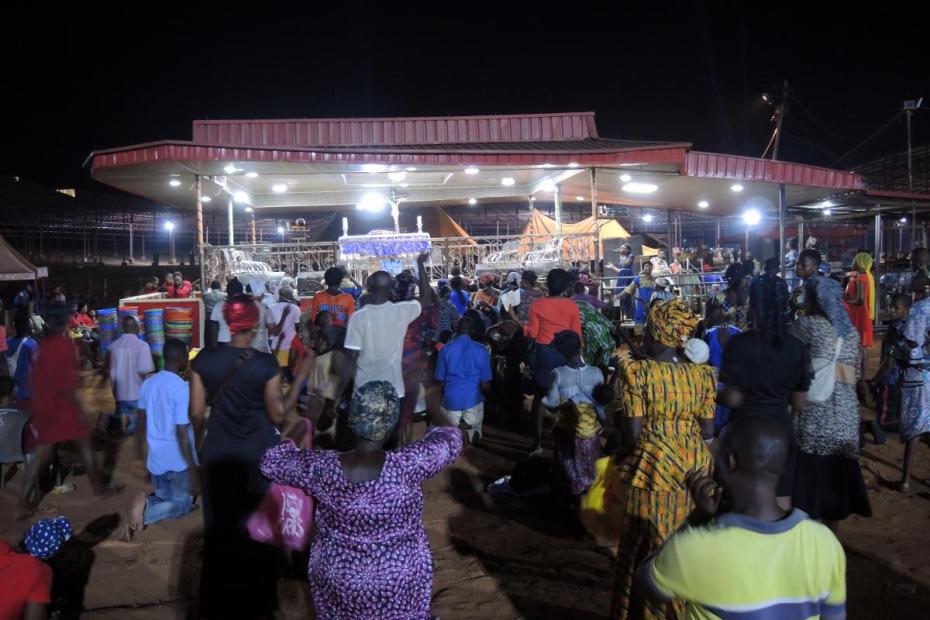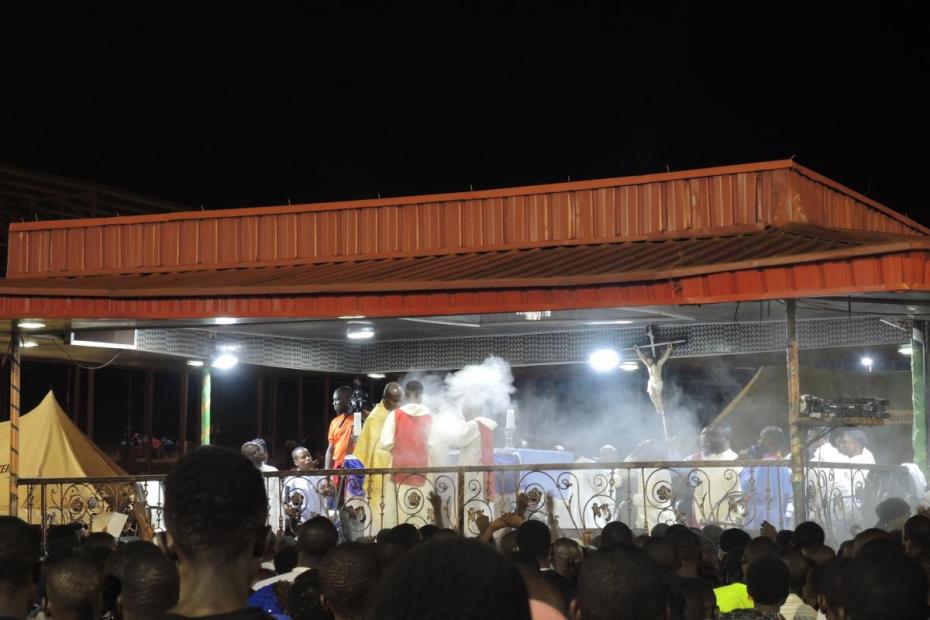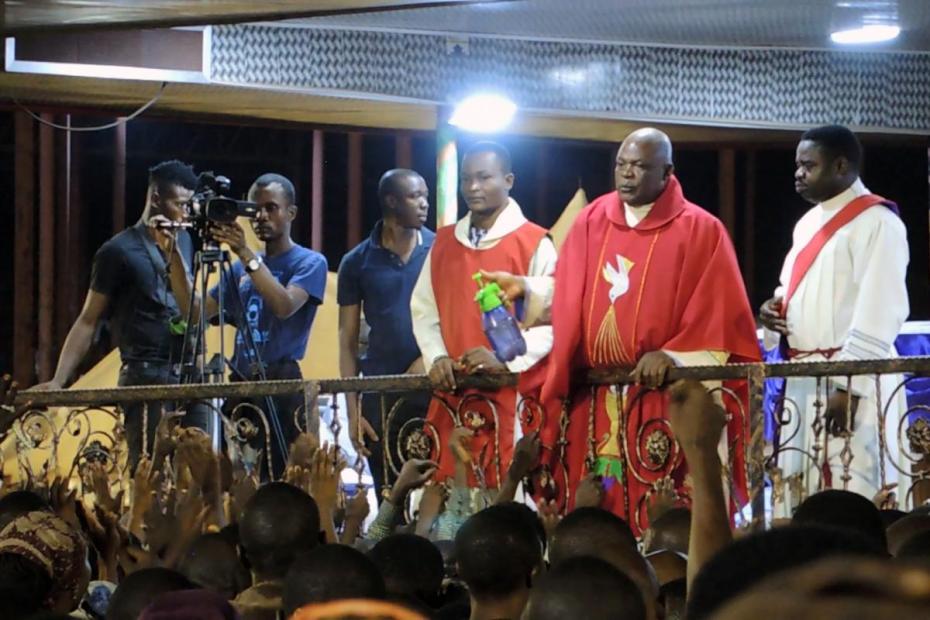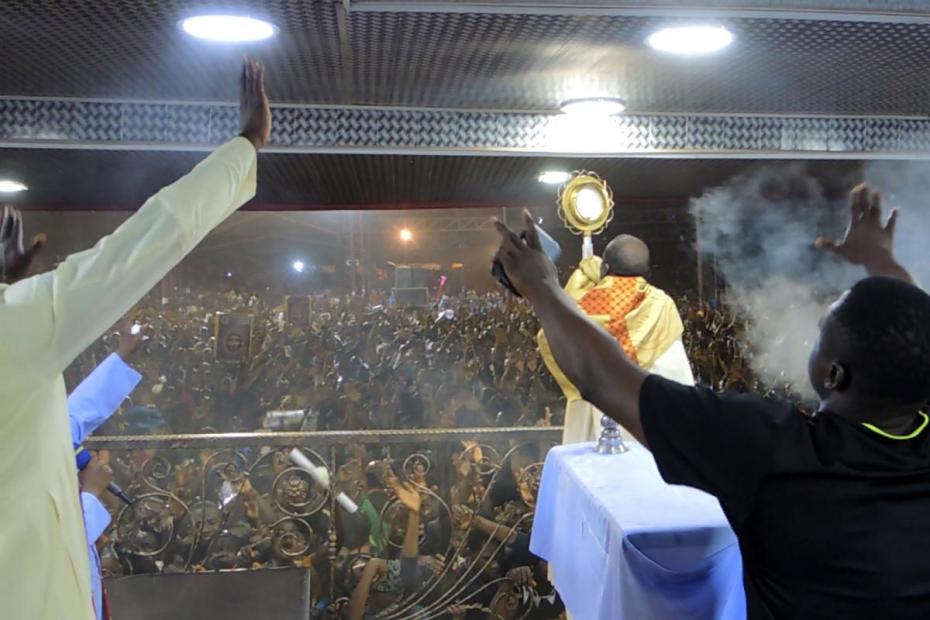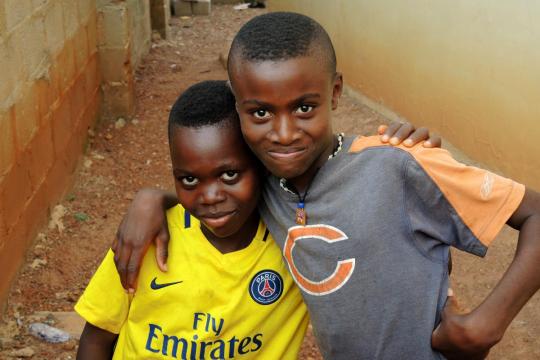Every Friday night, for almost all of the night, huge crowds, mostly people aged about 20-45, gather in the outskirts of Enugu, Nigeria for a prayer event that is easily among the best attended weekly gatherings in the Catholic world, and certainly one of the most energetic ones. The all-night worship at Fr. Mbaka’s Adoration Ministry radically reconfigures the relationship—and undermines the ordinary cultural distance—between post-tridentine devotion to the Blessed Sacrament, and Pentecostal-style prayer. One scholar describes it as the “Pentecostalization of Catholicism… [while] at the same time it is trying to Catholicize Pentecostalism.”1 Worship here combines preaching, ecstatic Eucharistic adoration, two Masses, anointing and dance in a way that is hard to imagine for anyone who has not seen it before. Fr. Camillus Ejike Mbaka, the spiritual director of the Adoration Ministry, is a celebrity and a force in the region, supported by many followers and clergy, though also controversial.
Starting at dinnertime on Friday evenings, devotees crowd the road to the stadium-sized grounds of the Adoration Ministry. Most walk there, and by 7 p.m. there are already thousands of devotees. They pray standing or on their knees, or dance, or simply wait on blankets and chairs they have carried with them for the start of Friday night adoration.2 For the next five hours, women and men, amplified by immense loudspeakers, take turns reciting what could be the highest volume Rosary ever, along with other prayers and religious songs. People approach the empty but brightly lit altar all evening, often holding up written petitions in prayer before leaving them in a big plastic basket in front of the altar. Asked whether or why it was important for them to write out the petitions, one participant noted that it was because Fr. Mbaka would pray over them, but then joked that it is so loud here that people probably think that prayers need to be written for God to hear them. The evening proceeds like that for five hours, at a seemingly unstructured pace, as the grounds fill up to about one-third capacity. The eventual size of the crowd is difficult to assess, but is easily in the tens of thousands. As this warm up ends, a prayer leader leads people in a chant, “I am more than blessed. I am a blessing.”
Around midnight, several priests and acolytes arrive at the altar to begin the more structured events of the night, beginning with Mass. The Mass is alternately solemn and ecstatic, with dancing among the crowds. Behind the altar, several tents house the many religious sisters and women’s association affiliates who have places reserved for them. As the evening proceeds, the altar also fills with priests and seminarians from the area. A team of cameramen videos the event for broadcast.3
Following Mass, a number of witnesses come forward at the altar to attest to the power of healing in their lives. At about 1:30 a.m., a large monstrance is brought out to the altar, and Fr. Mbaka, the founder of the ministry, arrives to launch a Eucharistic devotion that lasts for a good deal of the next three and a half hours. People in the crowd wave their arms enthusiastically towards the Blessed Sacrament, dance, sing, and hold up written petitions. Fr. Mbaka leads the praise and song and often kneels to the side of the altar before the Eucharist. He preaches intermittently during the night. In the midst of the service, there is a ceremony of anointing with oil for those who want to come forward on the altar. At one point, the preaching turns to promotion of two herbal remedies that the Ministry offers for sale, one for STDs, and another for a range of other illnesses.4
As the night goes on, following Fr. Mbaka’s preaching, the fervor of adoration seems to build even more. Amidst incense and dancing, the Blessed Sacrament is carried out in the monstrance a long distance around the inner perimeter of the stadium roof. Fr. Mbaka leads prayers promising that the power of God, manifest here, is more powerful than any Satanic force threatening people’s wellbeing. His preaching is powerful and effective, but overall, he clearly puts the Blessed Sacrament at the center of the evening. This night at least, he is mostly in the position of being lead worshipper, not the bearer of the monstrance.
Throughout the long night, worshippers persistently delight in encouraging others to keep praying, both orally and through motion, and movement is taken as the most genuine sign of devotion. Just before 5 a.m., adoration ends with a cry to the crowd, resonating among the people: “Good morning, kings. Good morning, queens,” and people seem to believe that about each other.
A closing Mass follows, led by a different priest, though already the streets back to town are again crowded with pedestrians and small buses making their way home in the pre-dawn hours.
Prophecy, healing, promise and challenge
Fr. Mbaka’s Adoration Ministry is not unique in Nigeria. In Nssuka, the diocese just to the north, for example, a charismatic priest, Fr. Paul Obayi, leads the Okunerere Adoration Ministry, which he founded in 2001. And many parishes have their own, diocesan-organized charismatic groups. But Mbaka stands out as a force. According to Stan Chu Ilo, Mbaka’s Adoration Ministry commands more participation than any other single Catholic event in the country.5 Everyone I encountered in Enugu was aware of the Adoration Ministry, and a great many of the people interviewed in other settings had visited the Ministry and believed in its power. A few expressed skepticism in private about the amount and kind of dancing or the way that the monstrance was carried, or had opinions about his relationship to politicians, but all believed that Fr. Mbaka’s work was powerful.6
Several devotees interviewed at the Friday night devotion reported having seen healings here. One man, who has been coming for six years, reported having seen a man brought here in a wheelchair with a spinal injury who ultimately got up and walked. A woman, he said, had a tumor in her throat that made her hardly able to breathe. They prayed over her, and the tumor burst, and she vomited it up. Another woman who was believed to be dead was brought here before she went to the morgue, I was told. “It was raining heavily, and God was sending the rains that people be healed, and she came back to life, like Lazarus.” A Catholic sister who is a regular devotee said, on the other hand, that all the miracles that she has seen there were not immediate and showy, but still very real, “the slow works of God, things that happen from God over the course of time after they come here.” Chief among these, for her, were cases where women had not been able to bear children, but eventually could, cases where the people themselves were changed by it into new people, with better lives.
Other devotees say that they come for “spiritual healing,” which in this context means to unblock, or protect them from, harms that befall them because of the sins of their ancestors. This belief, a deeply held aspect of traditional religion, is backed by passages from the Bible, and draws many people here.7 People who are failing at business, or have ailments or family challenges, often believe that the problems could be due to something related to their ancestors’ failings or displeasure toward them. Or they believe that the difficulties must be due to curses put on them by some living person who wishes them harm. Mbaka preaches powerfully Friday night that God can overcome all these powers of evil, including from witches and wizards, as can be seen on the video here. He also very evidently speaks to both the despair and the yearnings of the poor, promising them that God has not created the problems of Nigeria, and that God can help them individually and collectively overcome present-day problems.
Not all people come for healing or to pray for some relief from daily struggles, of course. One young man summarized it in a less instrumental way: “I love it because it is so radical the way it puts praise of Jesus at the center—Jesus meaning everything and being there present among us.” The Jesus he saw in the Blessed Sacrament had a fiery way of being out among the people, the priests who carried the monstrance did not hesitate to bring him out there in similar fashion, and the people did not hesitate to show their gratitude in a similarly fiery way in return.
Since God has not caused the problems people face, Fr. Mbaka has been vocal in arguing that corruption by many in power has. Mbaka is well-known beyond Enugu for his outspokenness against corruption and political failures. He is admired by many ordinary people for his fiery rhetoric against political leaders, from former President Goodluck Jonathan and President Muhammadu Buhari to mid-level leaders and judges, for bribery, corruption or incompetence.8
Other politicians try to publicly court Mbaka’s favor. In a move that some find too political, though others regard as appropriate, Mbaka has been supportive of Enugu’s current governor. In a homily in late 2016 he praised “the performance of Governor Ifeanyi Ugwuanyi of Enugu State, describing it as an exemplary display of visionary leadership,” even describing his administration as “anointed by God” according to media reports.9
The Nigerian bishops have criticized him publicly for his political endorsements and barred him in late 2018 from making political endorsements. Even after the bishops’ conference reiterated that no priest should endorse particular politicians, Mbaka reversed course and urged Nigerians to support President Buhari’s re-election in 2019.10
Governor Ugwuanyi visited the Adoration Ministry shortly after the Friday night Adoration recounted here.
Fr. Mbaka has been known for other kinds of prophecies, even prophesying that the Nigerian Rangers Football Club, Enugu’s local team, would win the national championship in 2016. After the victory, the team came to the Adoration Ministry to dedicate the trophy to God and to collect a donation from Mbaka, according to media reports.11
Though the prosperity gospel message was not excessively evident during the Friday Adoration session reported on here—Mbaka preached about liberation from forces of oppression, not about wealth—the ministry does seem to be generating a good deal of prosperity.12 Fr. Mbaka has recently built a rather massive, elegant, gated house above the Adoration Ministry grounds, and is apparently chairman of an investment and manufacturing group named Aqua Rapha [“Healing Water” Investment Ltd., bottler of seemingly most of the bottles of water sold in Enugu. Rapha makes other products like sodas and yogurt as well. Some Catholics were uncomfortable with business ownership by clergy, but others point to it as a source of generosity and good jobs. I even heard accounts of people who would refuse anything but Aqua Rapha water. I also heard a number of stories of Fr. Mbaka’s generosity and largesse in ways that had made a real difference in people’s lives.13 If that link to business was a worry for any of the Friday night devotees at the Adoration Ministry, it did not surface, or dampen enthusiasm.
Chaplaincy
In June 2021, the Local Ordinary of Nigeria's Enugu Diocese directed Fr. Mbaka's Adoration Ministry to function as a Chaplaincy, and “not [a] personality cult.” ACI Africa recounts a series of significant events that strained the relationship between Adoration Ministry Enugu and the diocese in 2021 that led to the directive.
- 1Fr. Stan Chu Ilo, personal conversation.
- 2This article is based on participation in an all-night visit to the Adoration Ministry the night of December 6-7, 2019. Thanks are due to Fr. Paulinus Ike Ogara for introductions made there, and to Fr. Mbaka for his gracious welcome, and for many ordinary people there who were eager to tell of the power of this ministry in their lives, or simply to goad, in the friendliest way possible, this 59-year-old foreigner to dance and to put my whole body into it.
- 3Not all of the events seem to make it to broadcast, but a few are here.
- 4Fr. Mbaka clarifies that these are not scientifically tested, but that they will work for those who need them and have faith, and that they help support the ministries. There is also a collection for the ministry, though this is done without unusual attention or fanfare, at least by the standards of the night.
- 5Stan Chu Ilo, “Searching for Healing in a Miraculous Stream: The Fate of God’s People in Africa” in Wealth, Health, and Hope in African Christian Religion: The Search for Abundant Life, eds. Stan Chu Ilo and Esther Acolatse (Lexington Books, 2018), 50.
- 6 For an extended theological reflection on Fr. Mbaka’s work, see Stan Chu Ilo, "Fr. Mbaka and the Prophetic Voice in Nigerian Politics," Premium Times, January 7, 2015, https://opinion.premiumtimesng.com/2015/01/07/fr-mbaka-prophetic-voice-nigerian-politics-stan-chu-ilo/.
- 7See, for example, Exodus, 34:7, where God promises to visit “the iniquity of the parents upon the children and the children’s children, to the third and the fourth generation.” New Revised Standard Version.
- 8See, for example, Dennis Agbo and Chinedu Adono, “Arrest More Judges, Mbaka Exhorts Govt,” allAfrica.com, November 29, 2016, https://allafrica.com/stories/201611290687.html, and Jude Ossai, “Buhari Surrounded by a Wicked, Satanic Cabal - Fr. Mbaka” Nigerian Tribune, January 2, 2018, https://tribuneonlineng.com/buhari-surrounded-wicked-satanic-cabal-fr-mbaka.
- 9Agbo and Adono, "Arrest More Judges."
- 10Jude Ossai, “2019: Mbaka Defies Ban, Mobilises Support for Buhari’s Reelection,” Nigerian Tribune, January 1, 2019, https://tribuneonlineng.com/2019-mbaka-defies-ban-mobilisesd-support-for-buharis-reelection.
- 11“We Prophesied that Rangers Will Win Nigerian League — Fr. Mbaka,” allAfrica.com, October 6, 2016, https://allafrica.com/stories/201610060035.html.
- 12The preaching during collection time did emphasize not being a “stingy soul,” about being generous and getting that paid back in return, but this was one theme among many others that night.
- 13n March 2020, the Sun newspaper reported that Mbaka claims that the ministry gives $2 million a month to local charities.
